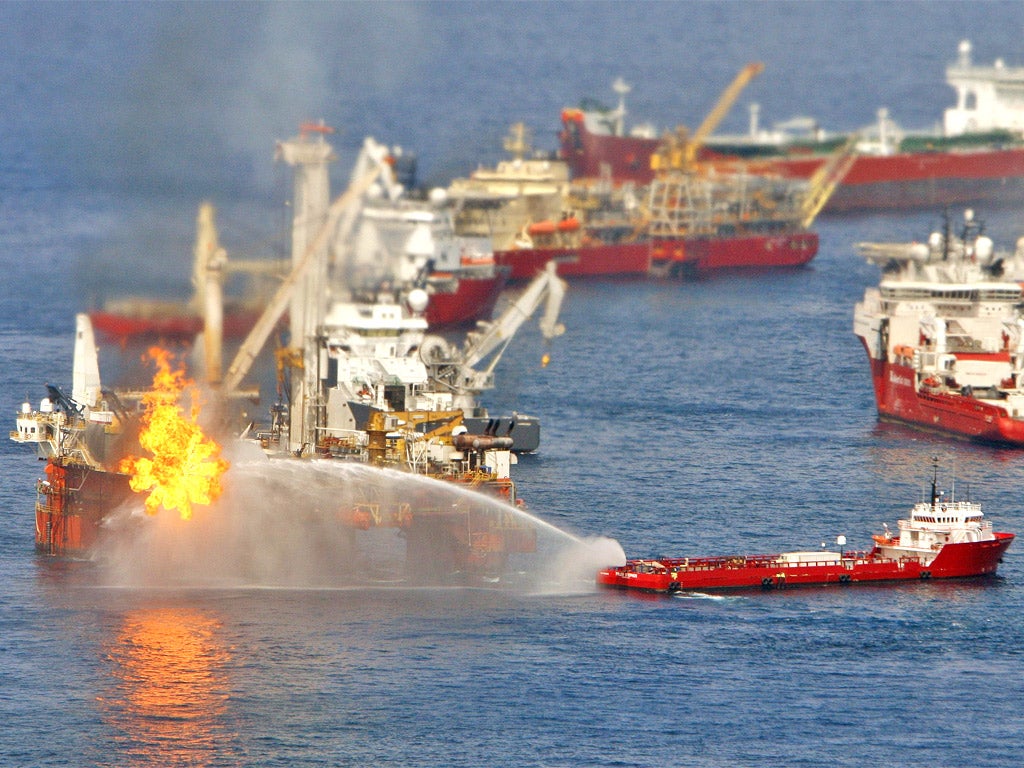BP's troubled waters
As problems continue to pile up, the oil giant's claim to have turned a corner is still seen as premature

Even Bob Dudley had to admit that BP's dramatic swing into the red was a disappointing show yesterday. And the BP chief executive got no argument from investors, who sent the FTSE 100 group's shares down by more than 4 per cent in their biggest one-day decline in nine months.
During a second quarter in which BP was apparently attacked from every angle, the oil giant recorded an astonishing change of fortune, reporting a far-worse-than-expected net loss of $1.4bn (£893m) for the period, down from a $5.7bn profit a year earlier.
Everything, it seems, was to blame. Mr Dudley pointed the finger of blame at everything but the kitchen sink yesterday after a multiple-whammy of woes descended upon the oil giant in the three months to July.
BP was hit by high production costs at the same time as oil and gas prices tumbled. This squeezed the company's bottom line twice over – once by reducing the profit margin on hydrocarbons produced in the second quarter and again by forcing the company to take $2.1bn of charges.
These related to BP's decision last month to suspend its Liberty project in the Arctic as cost estimates spiralled, and to a writedown in the value of its US shale gas assets as the growing popularity of "fracking" forced gas prices down to 10-year lows, while hiking up labour and equipment costs.
A further $2.7bn writedown relating to BP's out-of-favour US oil refining business compounded a gloomy picture in the country, albeit one where the company was buffeted by industry-wide problems. But even stripping out the impact of one-off charges, BP's profits came in 35 per cent lower at $3.69bn – well below consensus analyst estimates of $4.5bn.
"This is a pretty shocking set of results," said Iain Pyle, an analyst at Sanford C Bernstein.
"This is a very, very disappointing set of results; they missed across all fronts by a wide margin," concurred RBC Capital Markets analyst Peter Hutton.
"It was clearly a testing quarter," admitted Mr Dudley, blaming "a combination of factors affecting both the sector and BP specifically". Which brings us to BP specifically.
The hydrocarbon giant suffered a substantial, larger-than-expected decline in production after closing several key oil fields, such as Mad Dog and Atlantis, for maintenance in its crackdown on safety following the Gulf of Mexico oil spill in 2010. This helped push BP's US oil production down by a quarter.
Furthermore, the company increased by $847m its provision for compensation and other charges arising from the Gulf of Mexico oil spill, which resulted in 11 deaths and widespread environmental destruction. The company has now set aside a total of $38bn to satisfy the estimated bill.
The final of Mr Dudley's fingers of blame was pointed at Russia, where BP is seeking to sell its 50 per cent stake in its problematic joint venture with the AAR consortium.
TNK-BP contributed $700m less to BP's bottom line in the second quarter as the unit was punished by a lag in Russian oil export duty, which was based on earlier higher oil prices. Brent crude traded 7 per cent lower, on average, in the second quarter against the year before. Mr Dudley insisted yesterday that his claim last October that "BP had turned a corner" had not been premature, and that the company remained on course to meet its key target of delivering a 50 per cent increase in cash flow by 2014, compared with 2011.
He added that, by the end of the year, BP will have completed payments into the trust fund to compensate victims of the oil spill, production at Mad Dog and Atlantis will have resumed and new projects will have started up.
"I don't think the company is losing its way whatsoever," Mr Dudley said, adding that it "was heading in the right direction for the long term." Oil and gas prices also rebounded in July, he pointed out.
But he also admitted that BP would "continue to have a higher level of uncertainty" until two key issues were resolved. The first is the eventual bill for the fallout from the Gulf of Mexico oil spill. Mr Dudley reiterated that he is still open to a settlement with the government, having reached one earlier with the fishermen and other private claimants.
However, BP continues to insist it is not guilty of "gross negligence", and has based its $38bn estimate of its total payout on the court agreeing with its prognosis. If it does not, BP could incur at least $10bn of additional liabilities.
The second is the issue of Russia and the sale of its TNK-BP business – which out-of-pocket long-term investors hope will feed through into a hefty one-off dividend. However, Mr Dudley didn't give them any assurance on that front, saying "it's very possible that the sale may not materialise" and refusing to give any clues as to whether a disposal would even trigger a shareholder payout.
There is also the fact that, while a sale of TNK-BP would end years of acrimony with its joint venture partners, it has been a good earner, accounting for nearly a third of its oil production. While Mr Dudley pledged his continuing allegiance to what he called the "largest hydrocarbon country on the planet", he was unable to say how he would make up the shortfall left by the loss of the joint venture, except to say "stay tuned".
BP's shares yesterday fell by 19.4p to end the day at 425.05p, giving a clear sense that, whatever Mr Dudley might say, shareholders believe he called the "corner turn" too early.
Join our commenting forum
Join thought-provoking conversations, follow other Independent readers and see their replies
Comments
Bookmark popover
Removed from bookmarks